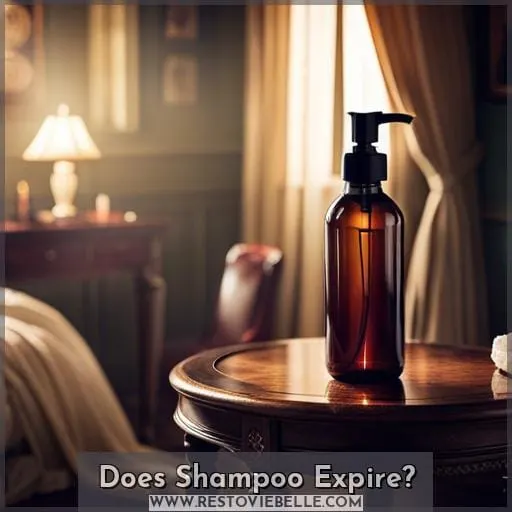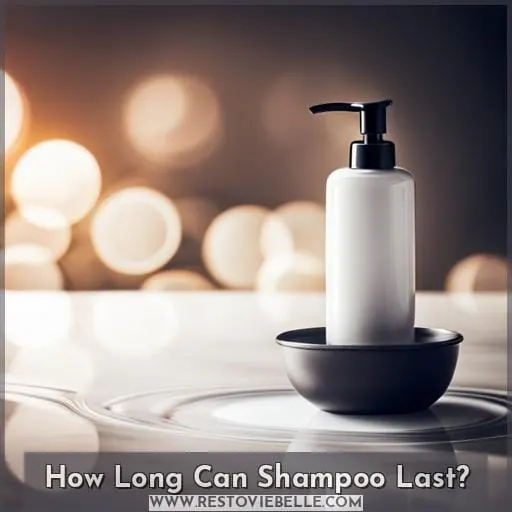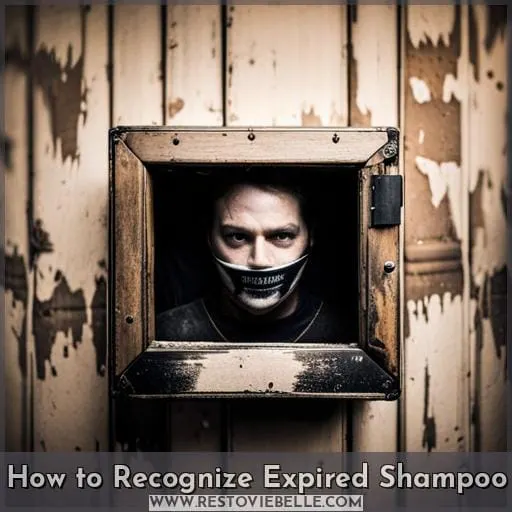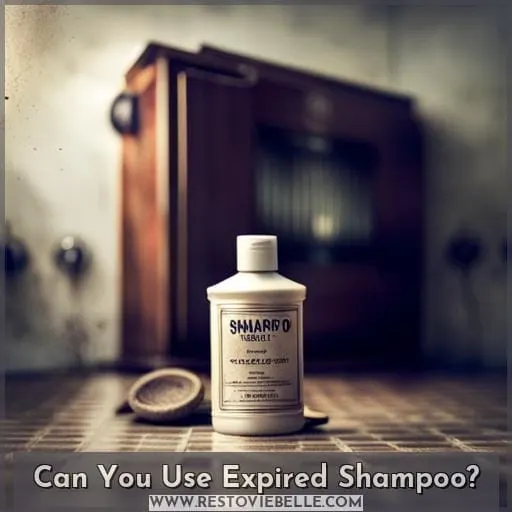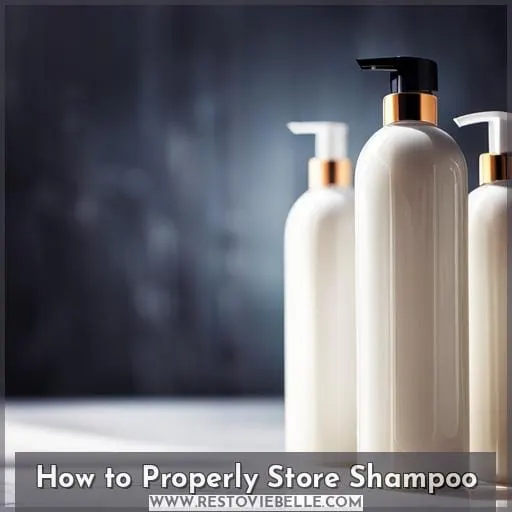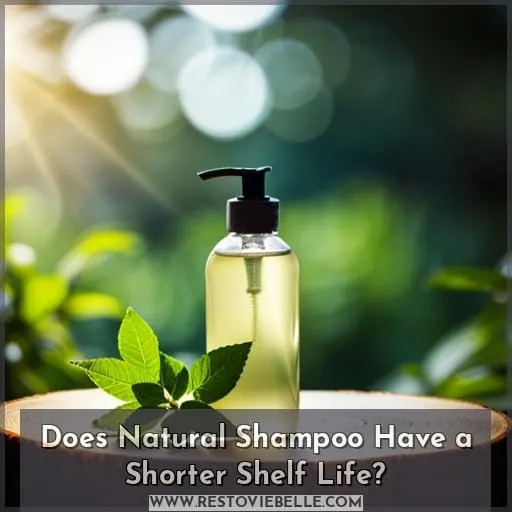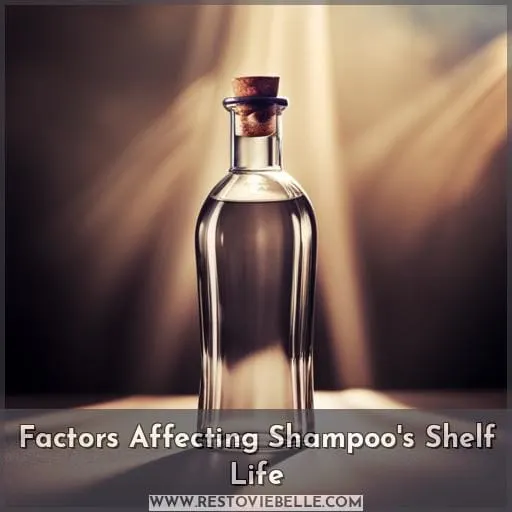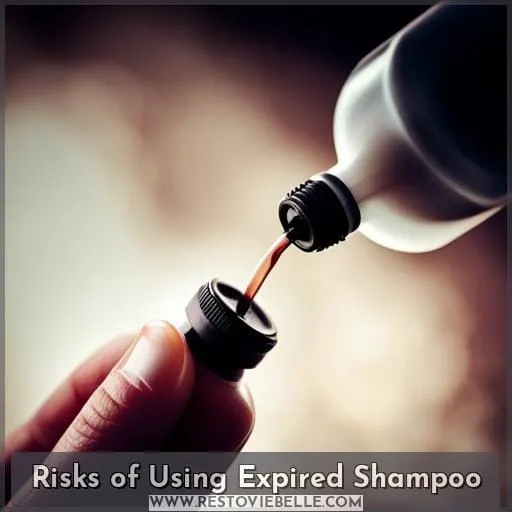This site is supported by our readers. We may earn a commission, at no cost to you, if you purchase through links.
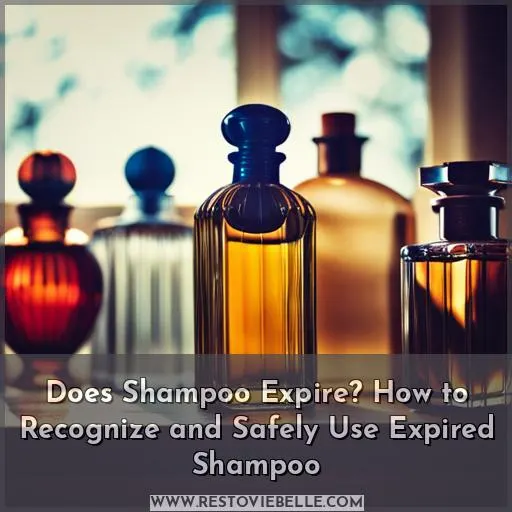 Picture this: You’re standing in the shower, ready to wash your hair with a bottle of shampoo tucked away behind the body wash.
Picture this: You’re standing in the shower, ready to wash your hair with a bottle of shampoo tucked away behind the body wash.
To answer these questions and more about shampoos expiring – and how to recognize them – read on. It turns out that yes, all shampoos do expire eventually although their use-by dates depend on factors like manufacturers’ ingredients lists or storage conditions.
Separation and discoloration as well as changes in smell are telltale signs your shampoo has expired; natural ones may be even shorter-lived than conventional products due to having fewer preservatives added into them by default.
Though you can usually still use expired shampoo safely if stored correctly under ideal light, heat and contamination levels; improper handling could lead to scalp infections or patchy hair loss so take proper precautions when dealing with old bottles!
Table Of Contents
Key Takeaways
- Shampoo does expire, and its shelf life depends on factors such as preservatives and storage conditions.
- Signs of expired shampoo include the separation of oil-based ingredients, discoloration, and changes in smell.
- Using expired shampoo can lead to dryness, dullness, scalp irritation, and allergic reactions.
- Properly storing shampoo away from light and heat is crucial to extending its shelf life.
Does Shampoo Expire?
You may not see an expiration date on your shampoo, but it’s important to be aware of its shelf life before using it in order to maximize the benefits and protect your hair. Unopened shampoo can last 2-4 years if stored correctly, while opened shampoo may expire in 6 months to 2 years depending on the type of preservatives used.
Look for the period after opening (PAO) symbol on packaging which indicates how long a product is safe for use. Using expired products can lead to dryness and dullness as well as scalp irritation or allergic reactions due to harmful bacteria present in them.
To prevent these risks, proper storage conditions must be followed – keep away from direct sunlight and heat sources; always seal the lid tightly after each use; consider subscribing to auto-refill services with exclusive price discounts – so that you don’t take chances with expired shampoos!
If signs like separation of oil-based ingredients or discoloration are noticed, then immediately discard them safely without any hesitation because old products won’t provide desired results no matter what kind they are – natural or water-based shampoos!
How Long Can Shampoo Last?
Knowing when to replace your shampoo is key for keeping hair healthy and hydrated. The shelf life of a shampoo depends on the type of preservatives used in its formula, ingredient list, and storage conditions.
Pay attention to expiration signs such as separation of oil-based ingredients, discoloration, or rancid smell before using it.
Unopened shampoo can last 2-4 years if stored correctly while opened ones may expire within 6 months to 2 years.
- Look for the period after opening (PAO) symbol on packaging, which indicates how long it remains safe to use.
- Natural shampoos may have a shorter shelf life due to less potent preservatives, so be aware!
- Keep away from direct sunlight and heat sources, and always seal tightly after each use.
Using expired shampoos can lead to dryness, dullness, and scalp irritation, so make sure you check product expiration dates regularly so that you don’t take any chances with them! Finally, never forget that proper storage practices will ensure maximum lifespan – this means avoiding contamination at all costs!
So now you know how long shampoo lasts – keep yourself informed about product expiry dates and follow good hygiene habits for happy hair days ahead.
How to Recognize Expired Shampoo
It is important to recognize when shampoo has expired, as using it past its expiration date can be potentially harmful to your hair and scalp. Signs of an expired shampoo include separation of oil-based ingredients, discoloration, changes in smell, and a loss of cleansing abilities.
Separation and Discoloration
If you notice any separation of oil-based ingredients or discoloration, your shampoo may be expired. Signs like these are also indicative of shelf life concerns and product integrity issues. Visual inspection is key when it comes to recognizing quality deterioration in shampoos gone bad.
To ensure safety, always store shampoo properly and check for preservatives on the label that will indicate its expected shelf life after opening (PAO).
Changes in Smell
Pay attention to any changes in the smell of your shampoo, as this is a telltale sign it has expired. Any shift from its original scent may be an indication that you need to throw out the bottle and purchase a new one.
To make sure you don’t miss signs of expiration:
- Perform a smell test before each use
- Keep track of when opened
- Examine the ingredient list for shelf life impact.
Changes in odor can occur due to dry shampoo ingredients breaking down or bacterial contamination resulting from improper storage conditions, so pay close attention! When smelling unfamiliar fragrances coming off your shampoo, discard it immediately for safety reasons and replace it with fresh product.
Loss of Cleansing Abilities
When using expired shampoo, you may notice it losing its cleaning power, like soap suds passing through your fingers. Natural shampoos are particularly prone to expiration due to less potent preservatives than synthetic ones.
Loss of cleansing effectiveness is a sign that the product should be discarded for hair health and safety reasons. Poor storage conditions can accelerate expiry risks, while proper storage will help maintain products longer than their estimated shelf life.
Can You Use Expired Shampoo?
You should not use expired shampoo, as it can be potentially harmful to your hair and scalp. While unopened shampoo may last for up to two years if stored correctly, opened bottles of regular shampoos typically only remain safe to use for six months or more depending on the type of preservatives used in its formula.
Natural shampoos tend to have a shorter shelf life due to their less potent preservatives, while water-based formulas rely on preservation agents that prevent bacterial contamination. Pay attention to ingredient lists and storage conditions when keeping track of your bathroom items’ expiration dates – light, heat, and contamination are all factors that can accelerate the process.
Using expired shampoo can lead to an array of unpleasant results such as dryness, dullness, and even potential irritation or allergic reactions from contact with bacteria present inside the bottle after its expiry date has passed.
Experts like cosmetic chemists Giorgio Dell’Acqua (Nutrafol) and Madison Thurman (Not Your Mother’s) advise discarding old products instead of taking chances with them – especially since proper usage is paramount in achieving desired haircare results without compromising safety standards along the way.
To help keep track of their custom haircare product’s best before date, Function Of Beauty offers auto-refill subscriptions every three months so customers don’t run out unexpectedly.
How to Properly Store Shampoo
Properly storing shampoo is essential to extend its shelf life and ensure its effectiveness. Light, heat, and contamination are all factors that can accelerate the expiration of shampoo; understanding these elements will help you store your products properly for optimal results.
Impact of Light, Heat, and Contamination
Take caution: light, heat, and contamination can quickly accelerate the expiration date on your shampoo. To maintain its shelf life and effectiveness, proper storage conditions are essential. Storing it away from direct sunlight or other sources of heat is key to preserving quality for longer.
Contamination should be avoided by closing the lid tightly after each use; otherwise, bacteria may form inside, which could negatively affect hair health if used after the expiration date has passed. Conditioner follows similar guidelines as shampoo, so keep an eye out for any signs of spoilage to avoid potential scalp irritation and allergic reactions that could arise from using expired products, such as Function of Beauty’s custom haircare line with a best-before date usually set at a 12-month time limit.
Pay attention to ingredient lists too – those containing preservatives will last longer than natural ones due to their more potent properties.
Importance of Tightly Sealing the Shampoo Lid
It’s important to keep your shampoo lid tightly sealed after each use, as this prevents contamination and extends its shelf life. Remembering to seal the lid helps maintain proper storage conditions for optimal hair health – no matter what type of shampoo you’re using.
Here are a few key points:
- Keeping the lid closed stops bacteria from entering and damaging the product.
- Sealing it correctly keeps moisture out, which preserves ingredients like natural oils.
- Locking in airtight ensures that preservatives remain potent enough to extend shelf life.
To ensure maximum benefits, store your shampoo away from direct sunlight or any other heat source while keeping it tightly sealed after every use.
Does Natural Shampoo Have a Shorter Shelf Life?
When it comes to the shelf life of natural shampoos, there are many myths floating around. While they may use fewer preservatives than traditional formulas, natural shampoo still has a definite expiration date and needs to be stored properly in order to maximize its lifespan.
It is important for consumers to understand how ingredient composition and storage conditions can impact the product’s shelf life, as well as debunking any myths about preserving their products indefinitely.
The main differences between regular shampoo and natural varieties come from their ingredients list. Typically, water-based shampoos require more potent preservatives to prevent bacterial contamination compared with oil-based ones, which have shorter lifespans due to less effective preservation methods.
Keeping these considerations in mind will help users get maximum use out of their haircare products without risking scalp irritation or hair damage caused by expired items – so pay attention! And always make sure you store your shampoo away from direct sunlight or heat sources.
Sealing lids tightly after each use also helps minimize potential contamination.
A key factor when trying to extend the lifespan of any type of haircare product is understanding what types of ingredients it contains and following basic storage tips like keeping them away from moisture or extreme temperatures where possible.
Finally, don’t forget that subscribing services such as Function Of Beauty’s auto refill offer great discounts on customized haircare supplies while helping customers keep track.
Factors Affecting Shampoo’s Shelf Life
When it comes to understanding how long a shampoo will last, ingredient lists and storage conditions play an important role. By looking at the ingredients, you can get an idea of what preservatives are used that affect its shelf life.
Additionally, improper storage, such as exposure to light or heat, can cause shampoos to deteriorate faster than expected.
Ingredient Lists and Preservatives
You’ll want to check shampoo ingredient lists for preservatives that can help extend its shelf life.
Preservative types, formulation impact, natural shampoos, and ingredient stability all play a role in determining the product’s shelf life.
- Synthetic preservatives are more effective than their natural counterparts when it comes to extending a product’s lifespan.
- The type of ingredients used in your shampoo will affect how long it lasts before expiring. Watch out for potentially hazardous chemicals like parabens or sulfates, which may have shorter expiration dates due to instability.
- Natural shampoos tend to contain fewer potent preservatives, so they may expire sooner if not stored correctly.
All these factors should be considered when evaluating the overall shelf life of your favorite products. Look at both the PAO symbol and read through any warnings on labels carefully before using them again after they have expired.
Storage Conditions
Properly storing your shampoo is key to keeping it safe and extending its shelf life. To ensure the product maintains optimal quality, follow specific storage guidelines. Avoid direct sunlight or heat sources. Keep all products sealed tightly after each use to prevent contamination from external bacteria and environmental factors that may reduce their shelf stability over time.
Preservation methods used by manufacturers are also important for prolonging product longevity. Water-based shampoos contain preservatives, while natural ones often have less potent alternatives due to the lack of synthetic compounds in their ingredients lists.
If you’re not sure how long a particular shampoo will last past opening, look for the Period After Opening (PAO) symbol on packaging. This symbol typically shows numbers like 6M or 12M, indicating the months before the expiration date arrives.
Finally, be mindful of other signs of expired shampoo, such as separation between oil-based elements or discoloration.
Risks of Using Expired Shampoo
Using expired shampoo can have serious repercussions for your hair and scalp health. When you use a product beyond its expiration date, it loses its effectiveness and may even become dangerous.
- Hair Damage: Expired shampoos can weaken hair roots and lead to breakage or split ends over time. This is because preservatives in the formula no longer provide protection against free radicals that damage hair strands.
- Scalp Irritation & Bacterial Contamination: Outdated shampoos often harbor harmful bacteria, which cause irritation on your scalp leading to itching or dandruff flare-ups if used regularly over time.
- Allergic Reactions: Old formulas may also contain allergens that weren’t initially present in their original formulation when they were new, increasing the risk for allergic reactions upon contact with skin or inhalation from aerosolized particles released during the application process.
Conclusion
So, there you have it – you now know the answer to the age-old question, Does shampoo expire? Not only does shampoo expire, but it’s incredibly important to know how to recognize and safely use expired shampoo.
Using expired shampoo can lead to dry, dull hair, scalp irritation, weakened hair roots, and even allergic reactions. To avoid these risks, check the PAO symbol on shampoo packaging and take proper storage precautions.
With a little bit of knowledge and effort, you can keep your hair looking and feeling its best for years to come.
